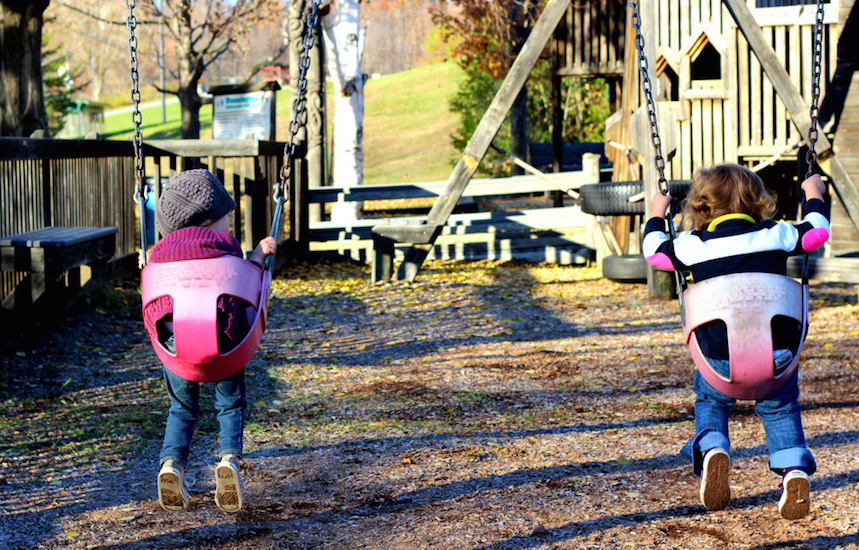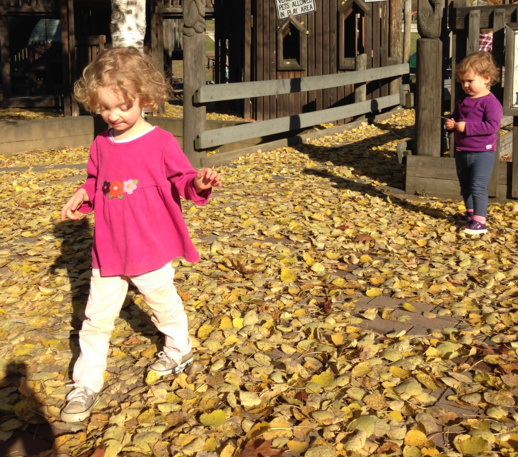It was 3 p.m., but it felt like 4 p.m., and we live in Vermont, so the low-hanging sun made it look like 5 p.m. My daughters, Fiona and Petra, and I cast long shadows on the ground. My shadow was in the middle, holding Fiona’s hand on my left and Petra’s hand on my right. We were at the town’s local playground to squeeze some outdoor play from the last hours of this beautiful, unusual 60-degree November day.
“Look how tiny that girl is,” cried a voice, and when I turned my head, a heavyset woman in her 50s was seated at a picnic table with a 50-something man and a boy. The woman was staring in our direction, smiling with an open mouth, but the smile was not for us. I knew which kid she meant.
I looked at her. I looked longer than I normally do. I tried to make my looking a piece of armor. I tried to make my look say: “Don’t do that. Don’t objectify my girl.” It hardens a person to give that look, and it’s a lonely thing to do, but when people even come close to making a spectacle of Fiona, a strange and dormant military is summoned inside me. There are horses in there. There are soldiers on those horses, wielding swords. The woman turned away and said nothing more.
I lifted my girls into the bucket swings and pushed. “Wee,” Petra said. Fiona grinned and signed “More.”

“I wanna swing,” cried the boy at the picnic table. The man said OK and followed him. The woman trailed slowly behind.
And so I pushed my kids, into the late day air, toward the sharp blue sky, beneath the low-hanging sun. And the man pushed his boy, and the woman looked on. The man and the boy talked, and the girls and I talked, which meant that Petra formed whole sentences and Fiona made subtly different vowel sounds that stand for specific words, and we communicated great meanings in this way.
But I felt something. I looked up and saw the woman staring at Fiona. Outwardly staring. Mouth agape, eyes concerned.
“Hello,” I said. It was the sharpest hello I knew how to utter. The flattest, most masculine hello I had in my arsenal. I was trying to do two things at once: cast the armor over my girl again, and require the woman to engage with us as humans. A hello usually beckons a return hello.
And she did say hello back. Then she turned her attention to the boy.
“Your hat fell off, Q-ball,” the man said and laughed. The boy laughed, too.
“Don’t call him that,” the woman snipped.
Intent on keeping the rhythm of pushing two kids at once (I push one kid with my left hand, pivot, await the other kid’s back with my right hand, push, pivot and repeat), I didn’t look over at the boy to check his haircut. But I knew then that he was bald, and that the woman didn’t like it.
“Friday we go to Albany to check your bone marrow,” the man said to the boy.
And just like that, my heart softened to the middle-aged woman. I’m an a**hole, I thought. How does that quote go? Be kind; everyone you meet is fighting a hard battle. Who knew what internal struggle the woman was trying to suss out when she looked at Fiona.
“Wouldn’t it be great if the whole winter was like this,” the woman said to everyone, and to no one, and to everything. To the 60-degree cloudless November day that graced us.
“Oh, I would love that,” I said. The trees here in Vermont have already been setting stage for winter. And last winter had been brutal, with weeks of single-digit highs.
“They wouldn’t be so cooped up,” the woman said. “They could run around and play. That’s what kids need.”
Our children kept swinging into the sky and back down. One was bald, and one was half the size of her peers and the third kept saying, “Wee.” The grandparents and I now had a common enemy: the cold. We had a common goal: to let our kids enjoy this life. I suspected the grandparents, like me, had bigger obstacles in that pursuit than the usual guardian.
I wanted to somehow bridge the divide between this family and mine. I wanted to say, “Hey, I know Albany Children’s hospital. Do you like the giant maze of tumbling balls, instilled into a glass wall on the first floor? Wasn’t that entertaining? Watching the balls get lifted and launched onto the metal tracks and race down like roller coaster carts?” I wanted to normalize the life they lived, which, given the woman’s tensing at the boy’s Q-ball nickname, must not feel normal to her. I wanted to say, “It’s OK that these bodies we live in are not always the promises we wished for. It’s cool. It’s life. I’m with you.” Or something like that.
But I didn’t see a window for that, and it was time for us to go.
“You’re shivering,” the woman said to the boy. “Look at him, he’s shivering.”
I pulled the girls out of the bucket swings and we headed toward the parking lot.
“It gets cool so fast,” the woman said.
“Yeah,” I said. “It’s getting cool.”
It took us several minutes to leave the wood-chipped playground. Petra got distracted by the monkey bars she couldn’t reach. Fiona plopped down and raked her hands through the wood chips. And somehow I found myself standing beside the woman, who was looking at her grandson.
“He just beat cancer,” she said to me quietly.
“I noticed you mentioned Albany Medical Center. We’ve been there, too. But we usually go to Dartmouth.”
I realized the woman probably wasn’t expecting me to talk about children’s hospitals. She probably wanted me to rejoice in her grandson’s victory, so I said, “He beat cancer. That’s so great.”
My kids, by some stroke of grace, were now walking in the same direction toward the parking lot, so I joined them. The woman walked a few steps behind me. The boy and his grandfather were trailing farther behind her. This was my chance. My opportunity to bridge the gap. To find common ground, commoner than weather, the greatest common ground of all: the experience of living without ground — living without certainty. Living with the knowledge that the body — with its legs and its lungs and its heart — is no promise. Is just a gift in whatever shape you get it. I wanted to say, “Yep, we too live an atypical life.” So I said, looking at Fiona, “She has a chromosomal syndrome.”
Without a beat passing between us, the woman asked, “How do they cure that?”
A single word can be a bomb. Cure. I realized this woman came from a perspective where disability had to be fixed in order for it to have meaning. He just beat cancer. For the woman, the boy had won. A medal dangled around his neck. When she asked how “they” would cure my girl, she was asking how my child would find victory, too.
Fiona walked up to my legs and pushed on them. “Ah, ah,” she cried, which meant she wanted me to pick her up. I lifted her 20 pounds into my arms. “No, they don’t cure it,” I said, because I don’t know when to walk away, or maybe because I’m a teacher and I teach poetic meter and Fretyag’s plot triangle and I teach how to integrate counterarguments into essays, so I think I can teach a whole paradigm shift on a playground. “It’s how she was designed.”
I tried for positivity in this last sentence, but it was laced with irritation, and I sounded tired. I was tired from the end of Daylight Savings and I was tired from the soon-to-be setting sun and I was tired from years of these conversations, where I try earnestly to become the living counterargument to people’s beliefs that my girl needs fixing. That a life with disability is a lesser, a pitiful life. I’m tired of trying to show the opposite by example. I’m tired of public spaces becoming places where bodies have to serve as living counterarguments.
Carrying Fiona, I walked away from the woman. Petra was toddling along with me.
“Well, how do they treat it?” the woman cried out, now maybe 15 yards away.
“Um,” I said.
“She’s so skinny,” the woman said.
I looked ahead, away from the woman, toward our car and the setting sun. “It’s how she was designed!” I called out, to the woman, to the chill air, to the bare trees, to everywhere.

Follow this journey on Star In Her Eye.
